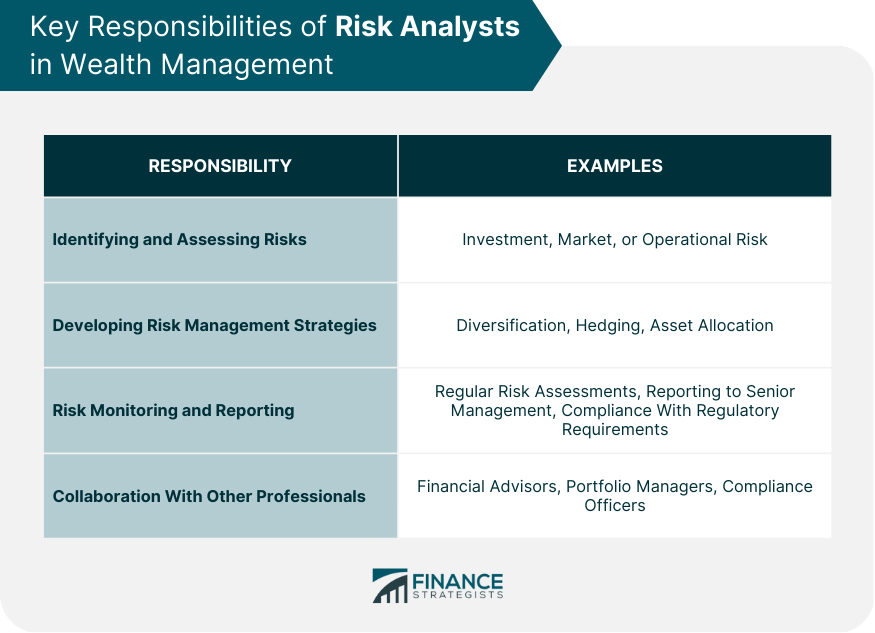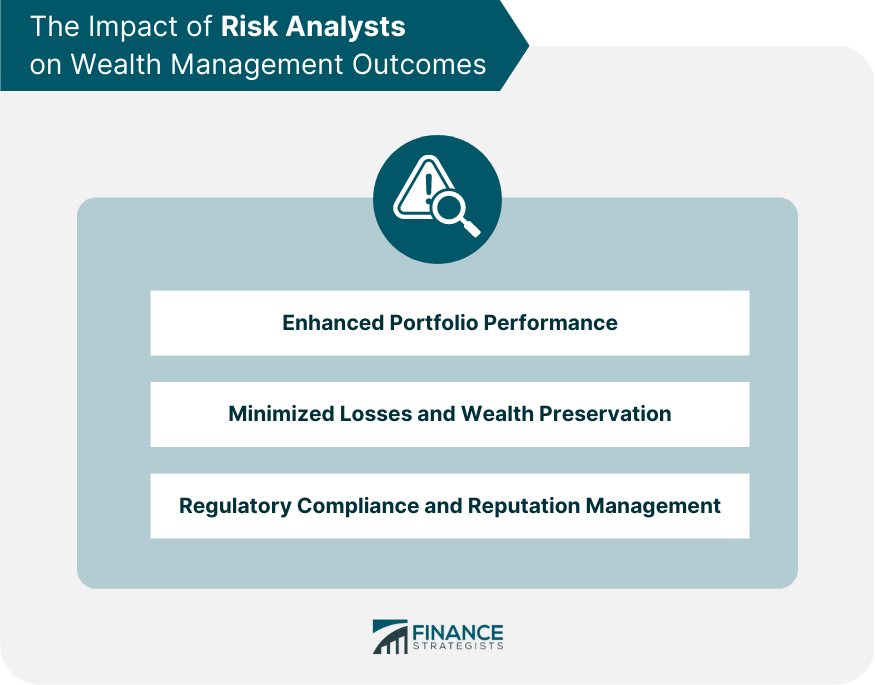A risk analyst is a professional who specializes in identifying, assessing, and managing risks in various financial contexts, including investments, operations, and market conditions. In the context of wealth management, risk analysts play a crucial role in helping clients and financial institutions achieve their financial objectives while minimizing potential losses. Risk analysts work closely with financial advisors, portfolio managers, and other professionals to evaluate and manage risks associated with clients' investment portfolios. Their primary goal is to ensure that clients' wealth is preserved and grown while adhering to their risk tolerance and financial objectives. Risk analysts contribute significantly to wealth management outcomes by enhancing portfolio performance, minimizing losses, and ensuring regulatory compliance. Their expertise helps clients navigate complex financial markets and make informed investment decisions. Risk analysts evaluate the potential risks associated with various investment options, including stocks, bonds, mutual funds, and alternative investments, to ensure clients' portfolios align with their risk tolerance and financial goals. Risk analysts monitor and analyze market conditions, such as interest rate fluctuations, economic cycles, and geopolitical events, to identify potential risks that may impact clients' investment portfolios. Risk analysts assess operational risks, including technology failures, human errors, and fraud, that could negatively impact clients' wealth and financial institutions' operations. Risk analysts recommend diversification strategies to spread clients' investments across various asset classes, sectors, and geographical regions, reducing the impact of potential losses on their portfolios. Risk analysts may advise on hedging strategies, such as derivatives and other financial instruments, to protect clients' portfolios from specific risks, such as currency fluctuations or market volatility. Risk analysts collaborate with financial advisors and portfolio managers to develop optimal asset allocation strategies, balancing risk and return based on clients' financial objectives and risk tolerance. Risk analysts conduct regular risk assessments to evaluate clients' portfolios, identify potential risks, and recommend adjustments to align with clients' objectives and risk tolerance. Risk analysts report their findings and recommendations to senior management, providing valuable insights to inform investment decisions and overall wealth management strategies. Risk analysts ensure that clients' portfolios and financial institutions' operations comply with relevant regulatory requirements, reducing the likelihood of fines, penalties, and reputational damage. Risk analysts work closely with financial advisors to develop tailored investment strategies that align with clients' risk tolerance and financial goals. Risk analysts collaborate with portfolio managers to construct and maintain investment portfolios that minimize risk while maximizing returns. Risk analysts coordinate with compliance officers to ensure that clients' portfolios and financial institutions' operations adhere to relevant regulations and industry standards. Risk analysts typically hold a bachelor's or master's degree in finance, economics, or a related field, providing them with a strong foundation in financial theory, analysis, and risk management. Many risk analysts pursue professional certifications, such as the Financial Risk Manager (FRM) or Chartered Financial Analyst (CFA) designation, to demonstrate their expertise and commitment to the field. Risk analysts must possess strong quantitative analysis skills, as they rely on statistical models, financial data, and other quantitative methods to evaluate and manage risks. Financial modeling is a critical skill for risk analysts, as it enables them to create detailed projections, analyze potential investment scenarios, and assess the impact of various risk factors on clients' portfolios. Risk analysts should be well-versed in various risk assessment methodologies, such as Value at Risk (VaR), stress testing, and scenario analysis, to evaluate and manage risks effectively. Risk analysts must be able to communicate complex concepts and findings clearly and concisely, both in writing and verbally, to inform investment decisions and ensure clients understand the risks associated with their portfolios. Risk analysts need strong reporting and presentation skills to convey their findings and recommendations to senior management, clients, and other stakeholders. Interpersonal skills are essential for risk analysts, as they must collaborate with various professionals, including financial advisors, portfolio managers, and compliance officers, to develop and implement effective risk management strategies. Risk analysts contribute to enhanced portfolio performance by identifying and managing risks, leading to better risk-adjusted returns and improved investment decision-making. By providing valuable insights into potential risks and recommending appropriate risk management strategies, risk analysts support clients and financial institutions in making informed investment decisions. Risk analysts' expertise in identifying and assessing risks helps minimize losses and preserve clients' wealth by addressing potential issues before they escalate. Risk analysts develop and implement risk management strategies that protect clients' portfolios from various risks, ensuring wealth preservation and growth. Risk analysts ensure that clients' portfolios and financial institutions' operations comply with relevant regulations, reducing the risk of fines, penalties, and reputational damage. By identifying and addressing potential risks proactively, risk analysts help financial institutions maintain a strong reputation and foster trust among clients and stakeholders. Risk analysts need to stay abreast of advancements in artificial intelligence and machine learning, as these technologies can enhance risk assessment and management capabilities. Big data and advanced analytics are transforming the way risk analysts identify, assess, and manage risks, enabling more accurate and timely decision-making. Risk analysts must adapt to an evolving regulatory landscape marked by increased scrutiny and changing regulations, ensuring ongoing compliance and minimizing potential risks. As new regulations emerge, risk analysts must stay informed and adapt their risk management strategies accordingly to protect clients' wealth and maintain regulatory compliance. Risk analysts need to monitor and assess the impact of geopolitical events and other global developments on financial markets, identifying potential risks and opportunities for clients. In an increasingly interconnected and uncertain world, risk analysts must navigate complex and interrelated risks to develop effective risk management strategies for clients. Risk analysts play a critical role in wealth management, helping clients preserve and grow their wealth while navigating complex financial markets and risks. The expertise of risk analysts significantly impacts client outcomes and wealth preservation by enhancing portfolio performance, minimizing losses, and ensuring regulatory compliance. Risk analysts must continuously improve their skills and knowledge, adapting to changing market conditions, technological innovations, and regulatory requirements to remain effective in managing risks and protecting clients' wealth. Their ability to identify, assess, and manage risks in an ever-evolving financial landscape makes them an indispensable part of the wealth management industry.What Is a Risk Analyst?
Key Responsibilities of Risk Analysts in Wealth Management
Identifying and Assessing Risks
Investment Risks
Market Risks
Operational Risks
Developing Risk Management Strategies
Diversification
Hedging
Asset Allocation
Risk Monitoring and Reporting
Regular Risk Assessments
Risk Reporting to Senior Management
Compliance With Regulatory Requirements
Collaboration With Other Professionals
Financial Advisors
Portfolio Managers
Compliance Officers

Skills and Qualifications Required for Risk Analysts in Wealth Management
Educational Background
Finance, Economics, or Related Fields
Professional Certifications (e.g., FRM, CFA)
Analytical Skills
Quantitative Analysis
Financial Modeling
Risk Assessment Methodologies
Communication Skills
Written and Verbal Communication
Reporting and Presentation
Interpersonal Skills
The Impact of Risk Analysts on Wealth Management Outcomes
Enhanced Portfolio Performance
Better Risk-Adjusted Returns
Improved Investment Decision-Making
Minimized Losses and Wealth Preservation
Timely Identification of Potential Risks
Implementation of Effective Risk Management Strategies
Regulatory Compliance and Reputation Management
Adherence to Regulatory Requirements
Mitigation of Potential Reputational Risks

Future Trends and Challenges for Risk Analysts in Wealth Management
Technological Innovations
Artificial Intelligence and Machine Learning
Big Data and Advanced Analytics
Evolving Regulatory Landscape
Increased Regulatory Scrutiny
Adaptation to New Regulations
Geopolitical Risks and Market Uncertainty
Impact of Global Events on Financial Markets
Navigating Complex and Interconnected Risks
Conclusion
Risk Analyst FAQs
A risk analyst is a professional who analyzes and assesses potential risks associated with investments and financial strategies. They provide clients with recommendations on how to manage and mitigate risks, ensuring that their wealth management strategies align with their financial goals and risk tolerance.
A risk analyst is responsible for conducting research and analysis on potential investment opportunities and assessing their risk level. They use various quantitative and qualitative methods to evaluate risks, such as market risks, credit risks, and operational risks. Based on their analysis, they provide recommendations on investment strategies that align with the client's goals and risk tolerance.
Risk analysis is essential in wealth management because it helps investors identify potential risks associated with their investments and financial strategies. By understanding the risks, investors can make informed decisions about their investments and take steps to mitigate those risks. Failure to consider risks can lead to significant losses and negatively impact an investor's financial goals.
To become a risk analyst, one needs to have strong analytical and quantitative skills. They must have the ability to analyze complex data and identify patterns and trends. Strong communication and interpersonal skills are also important, as they need to be able to explain complex financial concepts to clients in a clear and concise manner.
A risk analyst can help investors manage their wealth by providing recommendations on investment strategies that align with their financial goals and risk tolerance. They can conduct thorough risk assessments and provide insights on potential risks associated with different investment options. Risk analysts can also assist in diversifying investment portfolios, optimizing asset allocation, and developing risk management plans to minimize potential losses.
True Tamplin is a published author, public speaker, CEO of UpDigital, and founder of Finance Strategists.
True is a Certified Educator in Personal Finance (CEPF®), author of The Handy Financial Ratios Guide, a member of the Society for Advancing Business Editing and Writing, contributes to his financial education site, Finance Strategists, and has spoken to various financial communities such as the CFA Institute, as well as university students like his Alma mater, Biola University, where he received a bachelor of science in business and data analytics.
To learn more about True, visit his personal website or view his author profiles on Amazon, Nasdaq and Forbes.














